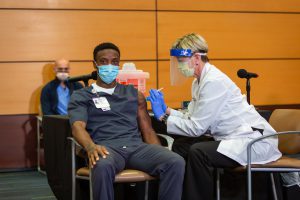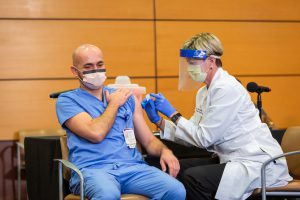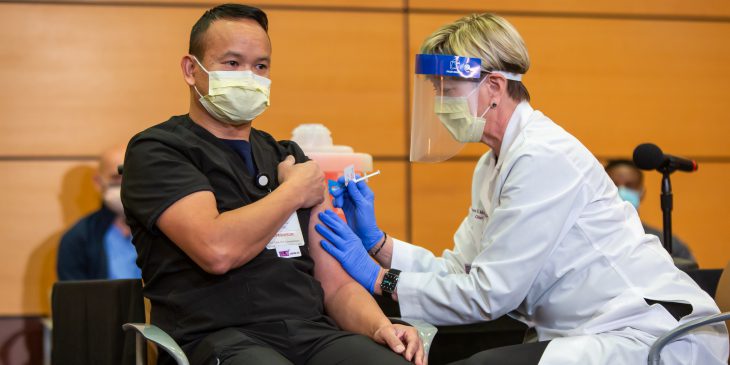A week after becoming some of the first health care workers in the country to receive a COVID-19 vaccine, 10 UPMC staff say they had minimal side effects — unless you count ample media attention and eager questions from co-workers and family.

UPMC Mercy transporter Ja’Ray Gamble receives his COVID-19 vaccine from Tami Minnier, UPMC’s chief quality officer.
The most common ailment of those who were vaccinated last week — the first five in front of media cameras, the second five immediately after — was arm soreness at the injection site. Other side effects reported were headache, muscle aches and pains, and low energy. None of the side effects caused any of the 10 to miss work.
What they all experienced, however, was the strange feeling of becoming the center of attention at work, at home and in the news.
Mild to No Side Effects
Of the 10, some felt little to no effect from the shot. UPMC Passavant nurse Christian Schott said he was feeling “just fine, nothing unusual” after receiving the vaccine. Of those who did have side effects, none lasted longer than a few days. Common side effects included:
• Arm Soreness: Nearly all experienced arm soreness or pain, which environmental services supervisor Manny Philavong likened to the days after getting the flu shot. The first staff member vaccinated, UPMC Presbyterian nurse practitioner Charmaine Pykosh, said she had no side effects other than a “sore arm for a day or two.”
• Headaches: After arm soreness, headaches were the most common complaint. Alli Okonak, a specimen collector at the UPMC South Side Collection Center, had mild symptoms for two days — “a sore arm for about 48 hours and a very mild headache for about 24 hours,” she said — but by the third day, “I was my normal self.”
• Lethargy: Beyond a sore arm, which subsided, UPMC Mercy transporter Ja’Ray Gamble felt “very low energy” on the third and fifth days after getting his shot. He didn’t miss work but did note that “it was difficult getting through an eight-hour shift” in his physically demanding role. His energy levels returned to normal, and now, he said, “I am feeling as normal as I was before I received the vaccine.”
• Muscle Aches, Dizziness: Dr. Sylvia Owusu-Ansah, UPMC Children’s emergency department physician, had the most adverse reaction to the vaccination. For her, the arm soreness was more intense than a flu shot. “It reminded me of getting a tetanus shot: My arm was extremely stiff and hard to lift up,” she said. While she was able to use her arm, she had to keep it moving and required ibuprofen the next day. “My legs were painful and felt like lead. I had to move around quite a bit,” she said. In addition, over the next couple of days, she had “a little bit of dizziness and headaches.” Like the others, her symptoms were short-lived, and she feels back to “100%” now.
‘Our Job Is to Stay Safe’
All 10 initial vaccine recipients possess a fervent belief in not only the vaccine’s safety and efficacy, but also a focus on their co-workers, family and community.
“I feel like it’s necessary to do what we must in order to ensure safety for ourselves, our family, our loved ones and those around us,” Gamble said.
Dr. Doug White, UPMC Magee ICU physician and UPMC endowed chair for Ethics in Critical Care Medicine at the University of Pittsburgh, said the vaccine is “safe and effective and is going to save lives.” It also represents a chance to ensure UPMC facilities remain able to treat those who need care.
“As health care workers, we’re on the front lines, so our job is to stay safe and keep working,” he said. “This vaccine is an incredibly important part of that process.”
‘Be an Example’
The staff members also relished the chance to be the model and help dispel doubts and fears about the vaccine.

ICU nurse Christian Schott receives his COVID-19 vaccine.
Owusu-Ansah’s coworkers asked her numerous questions about her experience and the vaccine’s accelerated development. It meant a lot to her, she said, that those co-workers said they were more willing to get the vaccine after watching her get it.
“It means that I have done what I set out to do,” she said, “which is be an example and allow people to truly educate themselves regarding everything that surrounds COVID-19.”
Philavong said he understood where some of the hesitation originated.
“I think they just do not know what to expect because it’s a new vaccine,” he said. “Some are basing their decisions on what they hear online or social media. I am more than happy to tell them I feel great and that they are able to see me every day at work.”
Following their first vaccination on Dec. 14, which provided initial protection from COVID-19, the group will receive the second booster shot 21 days later, in early January.
UPMC expects to provide a vaccine to all its frontline staff who wish to receive it by the end of January. Until vaccines are widely available across the United States and many people are immunized, all staff will remain vigilant by consistently practicing mitigation efforts like universal masking and hand washing.
‘One Step Closer’
This group’s experience represents not only the start of vaccinations for frontline health care workers, but also a tangible sign of hope after nine months of COVID-19 disruptions.
For Heather Majewski, who collects specimens five days a week at the UPMC South Side Collection Center, that hope for a brighter future is centered on her son and daughter.
“I noticed I’ve been a bit guarded in hugging my kids and being around them,” she said. “I’m excited because I feel I’m one step closer to being safe. To be able to give my kids the biggest hug is something I’ve been waiting for since March.”








